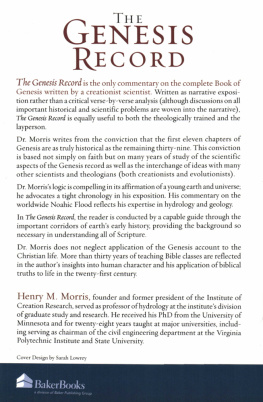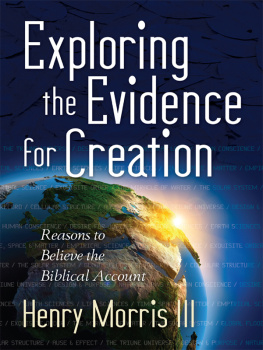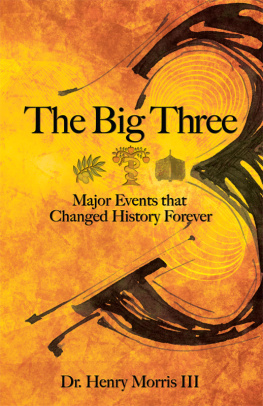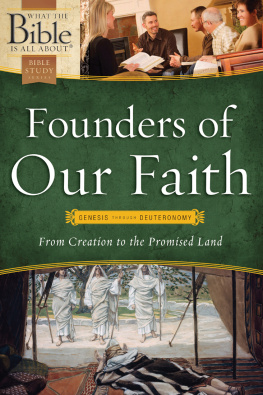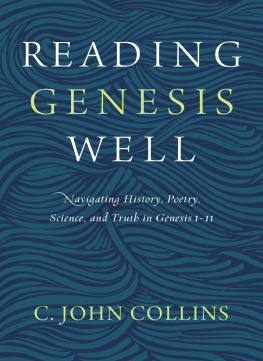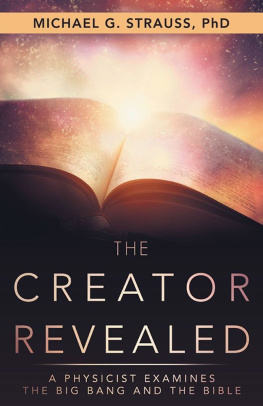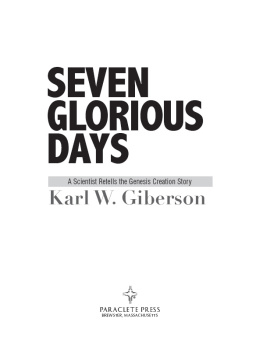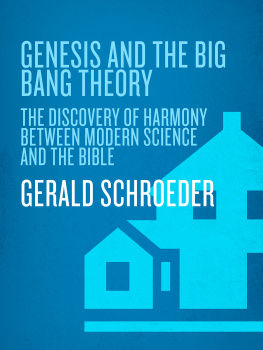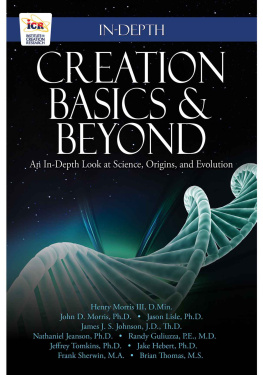

HARVEST HOUSE PUBLISHERS
EUGENE, OREGON
All Scripture quotations are taken from the New King James Version. Copyright 1982 by Thomas Nelson, Inc. Used by permission. All rights reserved.
Cover by Left Coast Design
Cover image AstroStar / Shutterstock
UNLOCKING THE MYSTERIES OF GENESIS
Copyright 2016 Henry M. Morris III
Published by Harvest House Publishers
Eugene, Oregon 97402
www.harvesthousepublishers.com
ISBN 978-0-7369-6798-3 (pbk.)
ISBN 978-0-7369-6799-0 (eBook)
Library of Congress Cataloging-in-Publication Data
Names: Morris, Henry M., author.
Title: Unlocking the mysteries of Genesis / Henry M. Morris III.
Description: Eugene, Oregon: Harvest House Publishers, 2016.
Identifiers: LCCN 2015049208 (print) | LCCN 2016014522 (ebook) | ISBN 9780736967983 (pbk.) | ISBN 9780736967990 (ebook)
Subjects: LCSH: Creationism. | Bible. GenesisCriticism, interpretation, etc. | Evolution. | Bible and science.
Classification: LCC BS651 .M697 2016 (print) | LCC BS651 (ebook) | DDC 231.7/652dc23
LC record available at http://lccn.loc.gov/2015049208
All rights reserved. No part of this electronic publication may be reproduced, stored in a retrieval system, distributed, or transmitted in any form or by any meanselectronic, mechanical, digital, photocopy, recording, or any otherwithout the prior written permission of the publisher. The authorized purchaser has been granted a nontransferable, nonexclusive, and noncommercial right to access and view this electronic publication, and purchaser agrees to do so only in accordance with the terms of use under which it was purchased or transmitted. Participation in or encouragement of piracy of copyrighted materials in violation of authors and publishers rights is strictly prohibited.
CONTENTS
N othing captures the minds of human beings more than the question of where we came from. The oldest writings ever uncovered have dealt with that issue, and it is no exaggeration to say the question still causes heated debate today. In our era of scientific inquiry, the majority view insists everything is the result of eons of chance interplay between physical forces and random collisions between various atoms and moleculesall with no design or purpose, just the happenchance of blind natural processes.
The secular theories of origins are many, complex, and technical, but the common theme among them all is that there is nothingabsolutely nothingsupernatural in the equations. Everything must be explained in natural terms. All that can be understood about the past must be delved from the examination of present processes and scientific reasoning. Anything even hinting of a miracle, anything that cannot ultimately be explained by natural laws, must be rejected. The one absolute is that there is no supernatural involvement by a deity of any kind.
Oh, it is generally accepted that one can be agnostic about the possibility of a being or a mind of some sort within the vast reach of outer space. But if such a person or being exists, it would be both impersonal and detached from any involvement in the interactions of the forces within our universe. Some would conjecture that such a Force (capital F) might have caused the initial singularity of that super-dense pinpoint of mass-energy that exploded in the Big Bang some 13-plus billions of years ago. But if so, whatever that may have been, it has long since dissociated itself from our reality.
Our universe is all there is. That is where the mainstream of academic thought is positioned today.
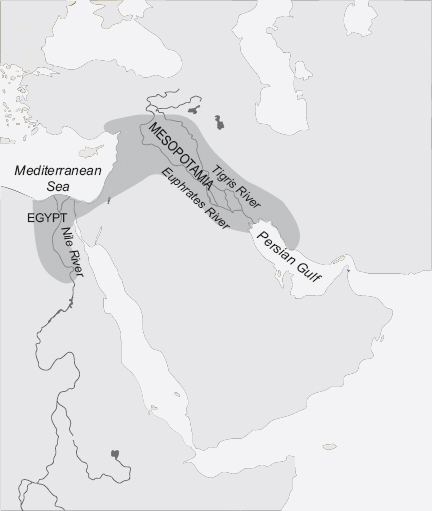
Figure 1.1The Fertile Crescent
The Past
It was very different in the recent past. Up until the surge of scientific thought in Europe in the sixteenth and seventeenth centuries, most of the various centers of civilization held to some form of polytheistic or pantheistic explanation for the universe. Beginning with the organized people groups around the cities of Babel and Nineveh in the Fertile Crescent, various forces of nature were personified as deities or demigods, or the universe was seen as an Over-mind or Force that controlled everything. As these explanations gained prominence, they became religions with a plethora of gods and goddesses who held court on certain high places and dabbled with the forces of nature and the lives of humans.
The Egyptians developed a sophisticated system of temple worship that mingled the ruling dynasties with various deitiesusually Ra, the sun god. The Nile, so important to their economic stability, was given deification in a series of gods and goddesses associated with the river, the fish in the river, and the annual inundation that fertilized their fields. Literally every facet of their daily lives was intertwined with gods or goddesses who at their whim could make life prosperous or miserable. There was no question in the minds of the Egyptians that supernatural forces were necessary to bring about the universe they lived in.
The Assyrian and Babylonian empires that followed were very similar. The names changed with the language and cultural emphasis, but gods and goddesses were still at the core of their world, making sure that all was developing according to their plan. Humanity could beg for insight from various oracles and pray to the gods, but it was the personified forces that ruled the universe. And the human rulers sought to identify with the most powerful god, often taking either a high-priestly role or, in some cases, claiming deity for themselves.
The Greeks and the Romans were great mimics of previous religious systems, often combining and assimilating the deities of earlier cultures or conquered territories into their pantheon, giving names to the deities of their more famous rulers or military generals. The Caesars of Rome typically deified themselves and demanded total allegiance, as well as claiming miraculous powers to keep rebellions in check.
Ultimately, each of these empires crumbled under the weight of mismanagementand in some rather startling events, by the intervention of the very God of the universe whom they were all denying.
Ordinary Observation
The common denominator among all the various religious systems and the sequence of empires and tributary nations was this: The reality of our world is so complex, so intertwined with order and purpose, so obviously full of observable cause-and-effect relationships that supernatural power was required to create it in the first place and to keep it from falling apart over time.
Today, we would recognize such observation as a key part of the scientific method.
The more humanity learned about the sciences (mathematics, astronomy, medicine, engineering, etc.), the more people came to the conclusion that the makeup of our universe was so intricate and so endued with unknown and inexplicable energies that something or someone outside and beyond our universe had to be involved. Thus, the gods and goddesses took on a greater reality as peoples understanding of the enormity of the universe expanded.
Every culture even had some kind of super-god or all-knowing god that was a catchall deity who took care of the mysteries. As the apostle Paul once declared to the scholars in Athens:
Men of Athens, I perceive that in all things you are very religious; for as I was passing through and considering the objects of your worship, I even found an altar with this inscription: TO THE UNKNOWN GOD (Acts 17:22-23).
Next page

